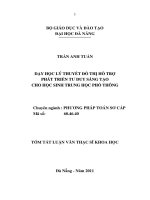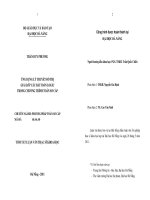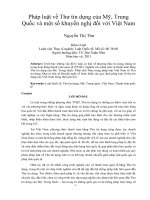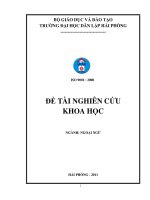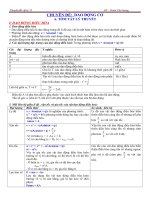động-từ-khuyết-thiếu-lý-thuyếtbai-tap
Bạn đang xem bản rút gọn của tài liệu. Xem và tải ngay bản đầy đủ của tài liệu tại đây (178.43 KB, 14 trang )
I. Định nghĩa Động từ khuyết thiếu
- Động từ khuyết thiếu là động từ nhưng lại không chỉ hành động mà nó chỉ giúp bổ
nghĩa cho động từ chính.
- Những động từ khuyết thiếu này có thể dùng chung cho tất cả các ngơi và khơng
chia theo thì. Các động từ theo sau động từ khuyết thiếu này được giữ nguyên thể.
II. Cách dùng động từ khuyết thiếu
1. Modal verb + V1
Modal
Cách dùng
Verbs
Ví dụ
Chú ý
Can và Could cịn được
dùng trong câu hỏi đề
nghị/xin phép, yêu cầu.
Diễn tả khả năng
hiện tại hoặc
Can
- I can swim - Tơi có
Ví dụ:
tương lai mà một thể bơi.
- Could you please wait
người có thể làm
a moment? - Bạn có
được gì, hoặc một - It can rain - Trời có thể đợi một lát được
sự việc có thể xảy thể mưa.
khơng?
ra.
- Can I sit here? - Tơi có
thể ngồi đây được
khơng?
- My brother could
Diễn tả khả năng
Could
xảy ra trong quá
khứ.
speak English when
he was five - Anh
trai tơi đã có thể nói
tiếng Anh khi anh ấy
5 tuổi.
Must
Diễn đạt sự cần
- You must get up
Mustn't - chỉ sự cấm
thiết, bắt buộc ở
early in the morning đoán
hiện tại hoặc
- Bạn phải dậy sớm
tương lai.
vào buổi sáng.
Ví dụ: You mustn't
smoke here - Bạn
- You must be tired
after work hard Đưa ra lời khuyên Bạn chắc chắn sẽ
mệt sau khi làm việc
hoặc suy luận
mang tính chắc
chăm chỉ.
chắn, u cầu
- You must be here
khơng được hút thuốc ở
đây.
được nhấn mạnh. before 8 a.m - Bạn
phải có mặt ở đây
trước 8 giờ.
I have to wear
Have to
Diễn tả sự cần
helmets when
thiết phải làm gì
driving a motorbike. Don't have to = Don't
nhưng là do khách - Tôi phải đội mũ bảo need to/ needn't (chỉ sự
quan (nội quy,
hiểm khi đi xe máy. không cần thiết)
quy định…).
(Luật quy định như
vậy)
- May và might dùng để
xin phép nhưng có tính
chất trang trọng hơn
Diễn tả điều gì có
thể xảy ra ở hiện
May
tại nhưng không
chắc.
can/ could. Nhưng
It may be a bomb - might ít được dùng
trong văn nói, chủ yếu
Nó có thể là một
quả bom.
trong câu gián tiếp:
- May I turn on TV?
- I wonder if he might
go there alone.
Might
Diễn tả điều gì có - She might not be
thể xảy ra ở q
in his house. - Cơ ấy
khứ.
có lẽ khơng ở nhà
Might được dùng
không phải là quá
anh ta nữa.
- Where is John? I
don't know. He
may/might go out
khứ của May.
with his friends. John ở đâu rồi? - Tôi
không biết. Có lẽ
anh ấy ra ngồi với
bạn.
- Tomorrow will be
Diễn đạt, dự đoán sunny. - Ngày mai
sự việc xảy ra
trong tương lai.
Will
trời sẽ nắng.
Diễn tả một giả
định xảy ra hoặc
dự đoán sự việc
có thể xảy ra
trong quá khứ.
Dùng để xin ý
kiến, lời khuyên.
"Will" được sử
dụng nhiều hơn
Should
cầu, lời mời.
- Did you buy sugar?
khơng? - Ồ, xin lỗi.
Giờ mình sẽ đi mua.
Shall
trong câu đề nghị, yêu
Đưa ra một quyết Oh, sorry. I'll go now. Will you have a cup of
định tại thời điểm - Bạn có mua đường coffee?
nói.
Would
Dùng Will hay Would
He was so tired. He
would get up late
tomorrow - Anh ấy
rất mệt. Ngày mai,
chắc anh ấy sẽ dậy
muộn.
Where shall we eat
tonight? - Tối nay
chúng ta ăn ở đâu?
Chỉ sự bắt buộc
- You should send
hay bổn phận
this report by 8th
nhưng ở mức độ
September.
nhẹ hơn "Must".
Would you like a cake?
- Bạn nên gửi báo
Đưa ra lời khuyên, cáo này trước ngày
Chỉ dùng với hai ngôi
"I" và “We”.
8 tháng Chín.
- You should call her.
ý kiến.
Dùng để suy
đốn.
- She worked hard,
she should get the
best result.
- Cô ấy học rất
chăm, cô ấy sẽ đạt
được kết quả cao
nhất
Ought to
Chỉ sự bắt buộc.
You ought not to eat
Mạnh hơn
candy at night. - Bạn
"Should" nhưng
không nên ăn kẹo
chưa bằng "Must". vào buổi tối.
2. Modal perfect khiếm khuyết hoàn thành) : Modal + have +
V3/ed
Một số cách biến đổi tương đương:
be necessary(for O) + to–V = need / have to
be unnecessary (for O) + to– V = don’t need / don’t have to
Ex: It is unnecessary for him to study many subjects.
He needn’t study many subjects
He does not have to study many subjects.
be possible / impossible+ to-V = can/ cannot + V hoặc may/might
Ex: It is impossible for me to finish it now.
I can't finish it now
perhaps( có lẽ) = may/might
it’s better/it’s time …..= should
be not permited /be not allowed = mustn’t
III. Bài tập về động từ khuyết thiếu
Exercise 1: Chọn phương án đúng
1. You don't look well. You ________ see a doctor.
A. could
B. need to
C. are to
D. should
2. She ________ home yesterday because her little son was sick.
A. could have stayed
B. must have stayed
C. had to stay
D. should have stayed
3. You ________ disturb him during his work!
A. should not
B. needn't
C. mustn't
D. don't have to
4. Whose car is this? – It ________ be Anton's. I think I saw him driving a
red car like this one.
A. could
B. might
C. must
D. would
5. Though he was ill and weak, he ________ get out of the burning building.
A. was able to
B. might
C. could
D. should
6. ________ lending me your CD player for a couple of days?
A. Can you
B. Would you mind
C. Would you
D. Could you
7. The windows look clean. You ________ wash them.
A. are not to
B. needn't
C. don't have to
D. mustn't
8. I don't believe it. It ________ be true.
A. can't
B. mustn't
C. shouldn't
D. wouldn't
9. Young people ________ obey their parents.
A. must
B. may
C. wil
l D. ought to
................
Exercise 2: Chọn phương án đúng
1. “Where do you think Rooney is today?". "I have no idea. He ________
late."
A. should have left
B. would sleep
C. would have sleep
D. may have slept
2. Barbate painted his bedroom black. It looks dark and dreary. He
________ a different color.
A. had to choose
B. must have chosen
C. should have chosen
D. could have been choosing
3. The children ________ "thank you" to you when you gave them their
gifts.
A. will have said
B. should have said
C. must say
D. should say
4. If we had known your new address, we ________ to see you.
A. came
B. will come
C. would have come
D. would come
5. These two boys look identical. They ________ twins.
A. must have been
B. should be
C. must be
D. should have been
6. You've been working non-stop for ten hours. You ________ be really tired.
A. should
B. must
C. would rather
D. ought to
7. The fortune teller predicted that ________ inherit a big fortune before the
end of this year.
A. will
B. she will
C. would
D. she would
8. I'm feeling very tired this morning. I ________ have stayed up late last
night.
A. couldn't
B. shouldn't
C. mustn't
D. to stopping
9. He helped her, but it was not necessary. He needn't ________ her.
A. help
B. to help
C. be helping
D. have helped
10. " ________ you like to play a game of tennis?" "I'd love to."
A. Could
B. Will
C. Do
D. Would
.................
Exercise 3: Chọn phương án đúng
1. The man was found unconscious at the foot of the cliff. He ________
have fallen 200 meters.
A. needn’t
B. must
C. should
D. mustn't
2 When the fog lifts, we ________ where we are.
A. could see
B. will be able to see
C. must have seen
D. are seeing
3. The swimmer was very tired, but he ________ the shore before he
collapsed.
A. was able to reach
B. can reach
C. could reach
D. has reached
4. If a letter comes for me, ________ you please forward it to this address.
A. shall
B. could
C. must
D. should
5. I don't believe it. It ________ be true.
A. can't
B. mustn't
C. shouldn't
D. wouldn't
6. Laura, you and the kids just have dinner without waiting for me. I
________ work very hard
today.
A. can
B. may
B. C. should
D. would
7. Leave early so that you ________ miss the bus.
A. didn't
B. won't
C. shouldn't
D. mustn't
8. He was very lucky when he fell off the ladder. He ________ himself.
A. could have hurt
B. should have hurt
C. must have hurt
D. will have hurt
9. Robert arrived without his book. He ________ it.
A. might have lost
B. should have lost
C. would have lost
D. will have lost
10. Twenty years ago, David ________ speak Arabic fluently. Now he's
forgotten a lot.
A. could
B. might
C. needed
D. must
......................
Exercise 4: Điền vào mỗi chỗ trống sau bằng một động từ khuyết
thiếu đã học.
1. I left my bike here and now it's gone. Someone ________ have borrowed
it.
2. "The door was open." "It ________ have been open. I had looked it myself
and the key was in my pocket."
3. I want this letter typed, but you ________ do it today. Tomorrow you will
do.
4. We ________ forget to shut the gates.
5. If you go to a dentist with a private practice, you ________ pay him quite
a lot of money.
6. You __mustn’t______ talk to other candidates: thí sinh during the exam.
7. "Have you seen John?" "No. But he __may______ be studying in the
library". May + be + Ving: thể hiện sự việc có thể xảy ra nhưng 0 chắc
chắn
8. As I won't be at home tonight, I ___have to_____ do my homework
during my lunch break.
9. Passengers ________ smoke until the signs have been switched off: tắt =
turn off.
10. There are a lot of tickets left, so you ___needn’t_____ pay for the tickets
in advance. V + in advance : làm gì đấy trước
11. I ____shouldn’t/needn’t____ have worn my best suit: com lê to the
party yesterday; everyone else was very casually: xuề xoà dressed: mặc.
12. "What are you doing this weekend?" "I haven’t decided yet. I
__may______ go on a picnic with my family."
13. Can you repair my bicycle? -Oh, yes, I __will______ do it now.
14. It's a secret. You _mustn’t_______ let anyone know about it.
15. I'm not sure. I __may______ come a few minutes late.
16. Secondary school students nowadays __have to______ wear uniform.
17. I had read the book last night before I went to bed. 1 never took it out
of this room. It ____must____be lying around here somewhere. Where
__can______ it be?
Must be + Ving: diễn tả những sự viêc dựa theo suy luận logic
18. When you have a small child in the house, you ___shouldn’t_____ leave
small objects lying around. Such objects ___might/may_____ be swallowed:
nuốt, causing (cause: nguyên nhân) serious injury: tai nạn or even death.
19. You __should______ take your umbrella along with you today. It
__might/may______ rain later on this afternoon. Take smt along with : mang
theo 1 cái gì đấy
20. I ____must____ be at the meeting: cuộc họp by 10 pm , I will probably:
có lẽ _have to_______ take a taxi if I want to be on time: đúng giờ.
